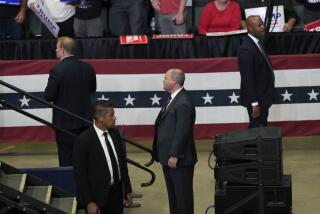House Votes to Press for Arms Pacts : Urges That Reagan Abide by SALT and Seek A-Test Ban
The House, expressing strong dissatisfaction with President Reagan’s approach to arms control, early today approved a $9-billion emergency spending bill that would force Reagan to seek a comprehensive nuclear test ban and to abide by the 1979 strategic arms limitation treaty.
The measure, which passed 208-178, reflects a growing impatience in Congress with the slow pace of U.S.-Soviet arms talks. It also was the first skirmish in what is expected to be a fierce, yearlong battle between the President and the Democratic-controlled Congress over arms control.
“It will be a big year for arms control,” predicted Rep. Norman D. Dicks (D-Wash.).
Mid-Range Arms Accord
Reagan’s supporters argued against the arms control provisions of the measure on grounds that the President is close to reaching an agreement with the Soviet Union to reduce intermediate-range missiles. But Democrats viewed it as a way to keep pressure on the President to negotiate arms control.
“If he’s on the eve of an agreement, he must live in the land of the midnight sun,” said Rep. Barney Frank (D-Mass.), referring to the President. “He’s been on the eve of an agreement since 1982.”
The House bill would force Reagan to resume adhering to the terms of the unratified SALT II treaty, which he violated last year by deploying additional bombers converted to launch cruise missiles. It also would prohibit the United States from conducting nuclear tests with a yield greater than one kiloton if the Soviets also agree to halt testing and adopt strict verification measures.
Felt Betrayed
Similar provisions were approved by the House last year shortly before the President’s meeting with Soviet leader Mikhail S. Gorbachev in Iceland, but House Democratic leaders agreed to drop those measures to give Reagan a free hand in the talks. Democrats then felt betrayed when Reagan decided in November to exceed nuclear launcher limits of the 1979 treaty.
“There’s a feeling here in the Congress that our advice wasn’t taken,” Dicks said.
Arms control advocates are hopeful that a similar bill can pass the Senate, which frequently has passed non-binding resolutions calling for adherence to the treaty but never has approved a binding measure on the subject. Liberals think there now may be enough supporters of the 1979 pact in the Senate to break a threatened GOP filibuster of the bill in that chamber.
Although the President surely would veto the legislation, Dicks noted that it would be a “major victory” for arms control advocates if a binding SALT II provision passed the Senate.
Besides containing arms control measures opposed by the President, the House measure eliminates an additional $500 million requested by Reagan in the current fiscal year for research on “Star Wars,” his space-based missile defense system. It also would leave intact existing prohibitions against testing of anti-satellite weapons and production of Bigeye nerve gas bombs--prohibitions that the President wants ended.
Like many of Reagan’s supporters, Rep. Henry J. Hyde (R-Ill.) asserted that the provisions calling for SALT II adherence and a comprehensive test ban are inappropriate at a time when the President is engaged in arms control talks with the Soviet Union.
“This Congress--the majority party--puts leg irons around our negotiators in Geneva,” he declared. “How stupid!”
Hyde and others said that, while the United States has violated the SALT II limit imposed on missile launchers, the Soviet Union has violated other aspects of the 1979 treaty.
But liberal Democrats countered that neither of the two arms control provisions of the bill touch on the issue of intermediate-range nuclear weapons, the most promising area of discussion in Geneva. Dicks also noted that Reagan had abided by the treaty for the first five years of his presidency, despite alleged Soviet violations.
Rep. Edward J. Markey (D-Mass.) argued that Americans still want a comprehensive U.S.-Soviet arms control agreement reducing all types of nuclear arms and that they cannot accept a pact limited to intermediate-range missiles as “a Kewpie doll, consolation prize.”
The House bill would provide about $3 billion less than Reagan requested from Congress to finance government operations through the remainder of the current fiscal year. The biggest single portion--about $6 billion--would be spent for continued funding of the federal farm price-support programs operated by the Commodity Credit Corp.
The measure originally provided more than $11 billion, but it was trimmed by about $2 billion on a motion by Rep. Buddy MacKay (D-Fla.) that was designed to make it conform with a budget resolution approved by the House just a few weeks ago. MacKay’s motion passed by a vote of 263 to 123.
Security for Pope
Also included in the bill was about $425 million for programs to aid the homeless, $147.8 million to fund the new immigration reform program, $2 million to pay for the House investigation of the Iran- contra scandal and $5.7 million to finance security for the protection of Pope John Paul II when he comes to the United States next September.
As originally proposed, the bill would have provided an additional $650 million for foreign assistance--including $300 million for Central America. The foreign aid money was slashed from the bill by a vote of 209-194 on an amendment offered by Rep. Robert S. Walker (R-Pa.), and Democratic leaders failed in an effort to reverse that decision.
Like all such omnibus spending measures, the bill included hundreds of special interest provisions such as one that would halt implementation of a federal rule requiring shrimp fishermen to use a device designed to free sea turtles that get caught in their nets. Shrimp industry supporters argued that it might increase unemployment in the gulf states.
More to Read
Sign up for Essential California
The most important California stories and recommendations in your inbox every morning.
You may occasionally receive promotional content from the Los Angeles Times.






